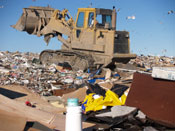
Current and future waste management activities are influenced by the legislative and policy framework in Northern Ireland. This includes EU waste policy which aims to reduce the environmental and health impacts of waste and improve resource efficiency. The majority of waste policy and guidance is based on EU Directives which are then translated into National legislation and policy within certain timescales.
After Brexit, EU waste policy continues to apply in Northern Ireland to a significant extent. The Northern Ireland Protocol, which is part of the Brexit withdrawal agreement, establishes a unique arrangement for Northern Ireland’s relationship with the European Union regarding various areas of law, including the environment.
Under the protocol, Northern Ireland remains aligned with several key aspects of EU environmental law. This alignment ensures that Northern Ireland continues to follow EU standards and regulations related to environmental protection and conservation including waste management.
The protocol also recognizes the role of the European Commission and the European Court of Justice (ECJ) in overseeing the implementation and interpretation of EU environmental law in Northern Ireland. The ECJ retains jurisdiction over matters related to EU law within the scope of the protocol, including environmental issues.
While Northern Ireland remains aligned with certain EU environmental laws, there may be some divergence over time between Northern Ireland and the rest of the United Kingdom in terms of environmental regulations and standards. The UK government has the ability to set its own environmental policies and standards for areas outside the scope of the protocol.
The EU Circular Economy Package aims to stimulate Europe’s transition towards a circular economy which will boost global competitiveness, foster sustainable economic growth and generate new jobs. In terms of recycling the key targets for municipal waste by 2025, the preparing for re-use and the recycling of municipal waste shall be increased to a minimum of 55 %, 60% and 65% by weight by 2025, 2030 and 2035 respectively.
Furthermore the EU Circular Economy Package aims to reduce the landfilling of municipal waste to a maximum of 10% of the total amount of waste generated by 2035. This means that member states are expected to prioritize other waste management options, such as recycling, reuse, and energy recovery, in order to achieve this target.
Therefore, the NWRWMG needs to continue the momentum already built up in relation to limiting and reducing the quantities of waste produced, while also further increasing the levels of recycling, recovery and diversion from landfill.

